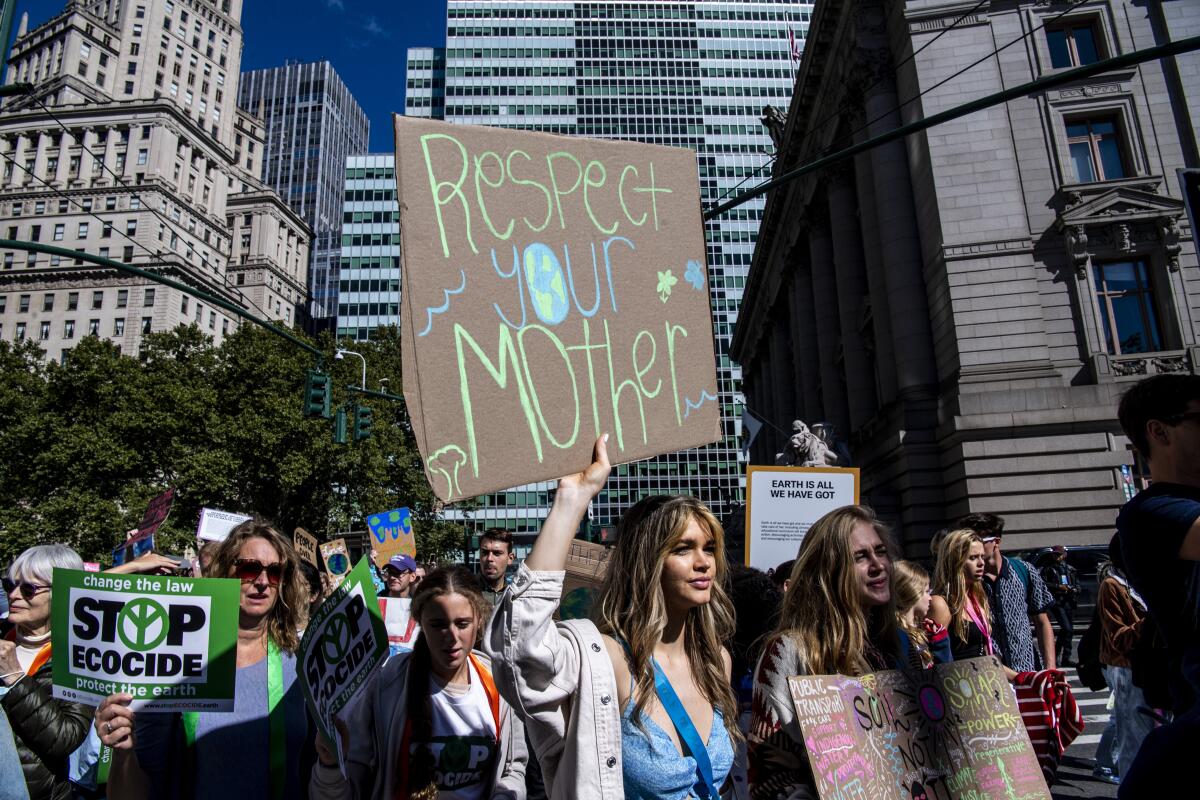Anxious and determined, young protesters demand climate action

- Share via
NEW YORK — Frustrated, anxious and a tad hopeful, young activists staged a coordinated “global climate strike” Friday to highlight the effects of global warming and demand more aid for poor countries hit by severe weather.
In New York, as leaders of developing disaster-struck nations pleaded their cases at the United Nations, more than a thousand young protesters, many of them skipping school, marched through the streets to tell their leaders they were sick of inaction on climate.
“The oceans are rising and so are we,” they chanted. Protesters also took to the streets in Jakarta, Indonesia; Tokyo; Rome; Berlin and Montreal carrying banners and posters with slogans such as, “It’s not too late.”
“It’s one thing to worry about the future, and it’s another to get out there and do something about it,” Lucia Dec-Prat, 16, said at the protest in New York. “I honestly feel that the adults aren’t listening.”
Dinah Landsman, 17, said every day she asks herself about what kind of future she’ll have because of climate change. Her generation has to act, she said.
“No one else is going to do it,” said Dinah, also in New York. “It’s us who have the most at stake.”
The protests follow warnings from scientists that countries aren’t doing enough to meet the 2015 Paris climate accord’s top-line target of limiting global warming to 2.7 degrees Fahrenheit this century compared with preindustrial times.
Michael Taft, a 27-year-old graduate student in New York, said that “a lot of kids here are scared about what the next 20 years are going to look like for them.”
But Taft said he still has hope. He looks around at those listening to the speakers and said they aren’t like past generations. They aren’t looking to become finance majors and make lots of money.
“They’re all here because they’re motivated to make change,” Taft said. “And probably one of the people here or in another climate rally in a different country is going to be the person that has a massive role in change and fixing this.”
The rallies were organized by the Fridays for Future movement that took its cue from activist Greta Thunberg, who began protesting alone outside the Swedish parliament in 2018.
“We’re striking all over the world because the governments in charge are still doing too little for climate justice,” said Darya Sotoodeh, a spokesperson for the group’s chapter in Germany.
“People all over the world are suffering from this crisis, and it’s going to get worse if we don’t act on time,” she said.
Police said some 20,000 people attended the rally in Berlin, which featured calls for the German government to establish a 100-billion-euro fund for tackling climate change.
In Rome, some 5,000 young people turned out for a march that ended near the Colosseum.
One placard read: “The climate is changing. Why aren’t we?” Students highlighted among their priorities the need to rethink Italy’s transport policies. The country’s ratio of cars to inhabitants is one of the highest in Europe.
In Italy’s election campaign, which wraps up Friday before Sunday’s vote for Parliament, climate change policies didn’t figure heavily at candidates’ rallies.
U.N. Secretary-General António Guterres told world leaders this week that the fossil fuel industry, which is responsible for a large share of planet-warming gases, is “feasting on hundreds of billions of dollars in subsidies and windfall profits while household budgets shrink and our planet burns.”
Guterres urged rich countries to tax the profits of energy companies and redirect the funds to “countries suffering loss and damage caused by the climate crisis” and to those struggling with the rising cost of living.
Demands for poor nations to receive greater financial help to cope with global warming, including the destruction already wrought by deadly weather events such as the floods in Pakistan, have grown louder in the run-up to this year’s U.N. climate summit.
More to Read
Toward a more sustainable California
Get Boiling Point, our newsletter exploring climate change, energy and the environment, and become part of the conversation — and the solution.
You may occasionally receive promotional content from the Los Angeles Times.










